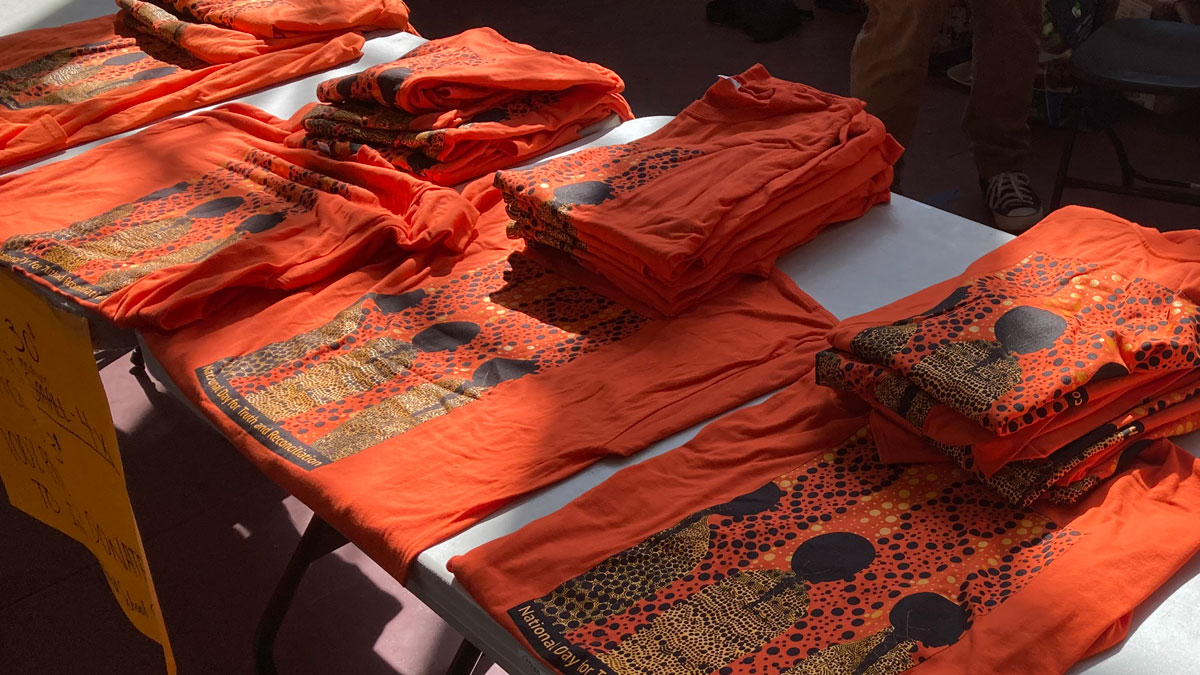Aside from the national events on Parliament Hill, some local organizations are marking the third National Day for Truth and Reconciliation — or Orange Shirt Day — with events on Saturday.
The First Nations Child & Family Caring Society, in partnership with the Assembly of Seven Generations and Beechwood Cemetery, will host guided walking tours in Beechwood Cemetery and in downtown Ottawa, starting at 10 a.m.
The downtown tour from 2 p.m. to 4 p.m. will highlight the role of non-Indigenous peoples and the federal government in creating the residential school system. The Beechwood tour will focus on key figures in building and dismantling residential schools in Canada.
“At the core of Orange Shirt Day, it’s so important to be able to honour survivors and their families, and also the children who didn’t make it home from the residential schools,” said Molly Rasmussen, reconciliation and research co-ordinator at the Caring Society.
Orange Shirt Day started in 2013 by Phyllis Webstad. It became a national holiday in 2021, following discoveries of what are believed to be mass unmarked graves near former residential school sites. The day provides an opportunity for Canadians to reflect on the lasting legacy of these schools and understand that reconciliation is an important process, say participants. (Editor’s note: In 2015, the Truth and Reconciliation Commission concluded that the Canadian government had enacted a policy of cultural genocide against Indigenous peoples, of which residential schools were “a central element.”)
In 2014, Beechwood Cemetery began the Great Canadian Plaques program, which worked with members of the Indigenous community to ensure that plaques more fairly reflected the legacy of Canadian historical figures.
“We’re looking at providing factual information,” said Nicolas McCarthy, director of marketing, communications and community outreach at Beechwood. “A lot of people look at reconciliation as rewriting history, and the way we view it is that this is a history that was never publicly told. This is a history that was never added because history was always written by the same institutions.”
As of this month, Beechwood has replaced five plaques, but McCarthy said they are hoping to update five more soon.
Beechwood will also unveil the Children’s Sacred Forest at 2 p.m. as a living monument to honour the children who never made it home. It will feature seven trees that “will never be taller than a 10-year-old child,” said McCarthy, as a reminder of the many children lost to the residential school system.
“We’re getting people that are not only policymakers, decision-makers, we’re getting analysts, all kinds of people from the government that are now doing these tours … We regularly get tour buses from all across Canada who have requested this tour through us so that they have a better understanding,” McCarthy said.
Other family-friendly resources will be made available through seven branches of the Ottawa Public Library on Orange Shirt Day. Programming will feature Indigenous books, films and the opportunity to contribute to a heart garden or paint remembrance rocks.
“Ottawa Public Library is committed to offering programs and resources to help understand the harmful legacy of the residential school system,” Chief Librarian and CEO of the Ottawa Public Library Sonia Bebbington said in a media release. “The Library is a place where you can learn more about Indigenous history, culture, and communities. We hope that you will take part in OPL’s activities with friends and family to learn, reflect on, and contribute to truth and reconciliation.”
Although the annual outpouring of support for residential school survivors helps shed light on the persisting issues facing Indigenous peoples, continuous support is key to being a better ally, said Rachel Agnew, an Ojibwe woman of mixed Scottish ancestry and member of Garden River First Nation. Agnew is co-president of the Indigenous Law Student Governance at the University of Ottawa and said in many communities, accountability and reciprocity are “huge values.”
“Take some time … commit to what you’re doing to support Indigenous people all year ’round,” Agnew said. “That’s what I recommend non-Indigenous people do on Sept. 30. It’s an important day, but year-long allyship is, I think, much more effective in the long run.”
Editor’s note: This article has been updated to better describe Rachel Agnew and reflect that accountability and reciprocity are important to many communities.




